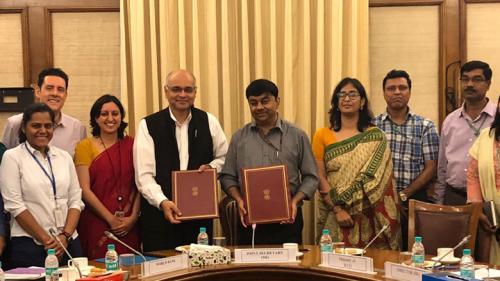Project Signing : Government of India and World Bank Sign Agreement for Additional Financing to India’s National Nutrition Mission (POSHAN Abhiyaan) to 315 Districts across all States and UTs
The Government of India and the World Bank, on May 7, signed an additional financing of US $200 million to fund the National Nutrition Mission (POSHAN Abhiyaan) and support the Government of India achieve its goal of reducing stunting in children 0-6 years of age from 38.4% to 25% by the year 2022.

The agreement for the Project was signed by Sameer Kumar Khare, Joint Secretary, Department of Economic Affairs, Ministry of Finance (Right), on behalf of the Government of India and Junaid Ahmad, Country Director, World Bank India (Left), on behalf of the World Bank
On December 1, 2017, the Government of India announced the new National Nutrition Mission. A large component of this Mission involves gradual scaling-up of the interventions supported by the ongoing World Bank assisted Integrated Child Development Services (ICDS) Systems Strengthening and Nutrition Improvement Project (ISSNIP) to all districts in the country over a 3-year period. The additional financing approved will support the first phase scale up to 315 districts across all states and union territories (UTs), on May 7.
The agreement for the Project was signed by Sameer Kumar Khare, Joint Secretary, Department of Economic Affairs, Ministry of Finance, on behalf of the Government of India and Junaid Ahmad, Country Director, World Bank India, on behalf of the World Bank.
“The Project will directly contribute to the Government of India’s renewed commitment to address the challenge of undernutrition under the recently announced POSHAN Abhiyaan. It will deepen the interventions of the ongoing ISSNIP, focus on improving quality and scaling-up to additional districts,” said Sameer Kumar Khare, Joint Secretary, Department of Economic Affairs, Ministry of Finance. “The focus will be on improving service delivery through better community engagement and introduction of performance-based incentives for ICDS field functionaries.”
With a focus on improving the coverage and quality of ICDS nutrition services to pregnant and lactating women and children under 3 years of age, the project will include investments in improving the skills and capacities of ICDS staff and community nutrition workers, instituting mechanisms of community mobilization and behavior change communication, strengthening systems of citizen engagement and grievance redress and establishing mobile technology based tools for improved monitoring and management of services for better outreach to beneficiaries during the critical 1,000 day window for nutrition impact. The project will additionally ensure convergence of all nutrition related schemes and provide performance based incentives to states and community nutrition and health workers, facilitating a focus on results.
During its first phase, ISSNIP had primarily focused on designing and piloting at scale some of these interventions. These included developing a system of incremental learning for community nutrition workers, guidelines and tools for community mobilization and behavior change communication and mobile based monitoring systems under the ICDS program. Through these interventions, since September 2015 it has trained approximately 0.4 million ICDS staff and community nutrition workers on maternal, infant and young child nutrition counselling and reached approximately 29.7 million pregnant and lactating women and children 6-36 months of age through the ICDS services across 162 districts in eight states.
“Undernourishment can begin before a child is even born, with the critical period continuing until she turns two. Undernutrition during this period could have lasting impact on a child’s life and result in mortality and lower cognitive skills; they are more likely to drop out of school and are less productive later in life,” said Junaid Ahmad, World Bank Country Director in India. “This project will support the government’s efforts in building the necessary institutional capacity and systems needed to improve nutrition for expecting mothers and their children. The POSHAN Abhiyaan is a significant milestone for India and the World Bank is delighted to be part of this initiative,” he added.
On May 7, approximately one-fifth of the children in India are born with low birth-weight, 35.7 percent of children under five are underweight, 38.4 percent are stunted, 21 percent are wasted and 58.4 percent are anemic. Research shows that inappropriate maternal and child feeding and caring practices, exposure to repeated infections, inadequate utilization of health services, and poor sanitation, especially during pregnancy and in the first two years of life, are among the key contributors to malnutrition.
“Implementation of the POSHAN Abhiyaan is in full swing and we are confident that through this intensive and systematic effort we will be able to reduce the burden of undernutrition in the country said Rajesh Kumar, Joint Secretary, Ministry of Women and Child Development,. World Bank support through ISSNIP allowed us to pilot some of the approaches that are now under the POSHAN Abhiyaan and with this next phase of support we will build on these interventions and make nutrition a national movement, he added.
The loan, from the International Bank for Reconstruction and Development (IBRD), has a maturity of 19.5 years including a grace period of four years.
Source: World Bank
- 352 reads
Human Rights
Fostering a More Humane World: The 28th Eurasian Economic Summi

Conscience, Hope, and Action: Keys to Global Peace and Sustainability

Ringing FOWPAL’s Peace Bell for the World:Nobel Peace Prize Laureates’ Visions and Actions

Protecting the World’s Cultural Diversity for a Sustainable Future

Puppet Show I International Friendship Day 2020

